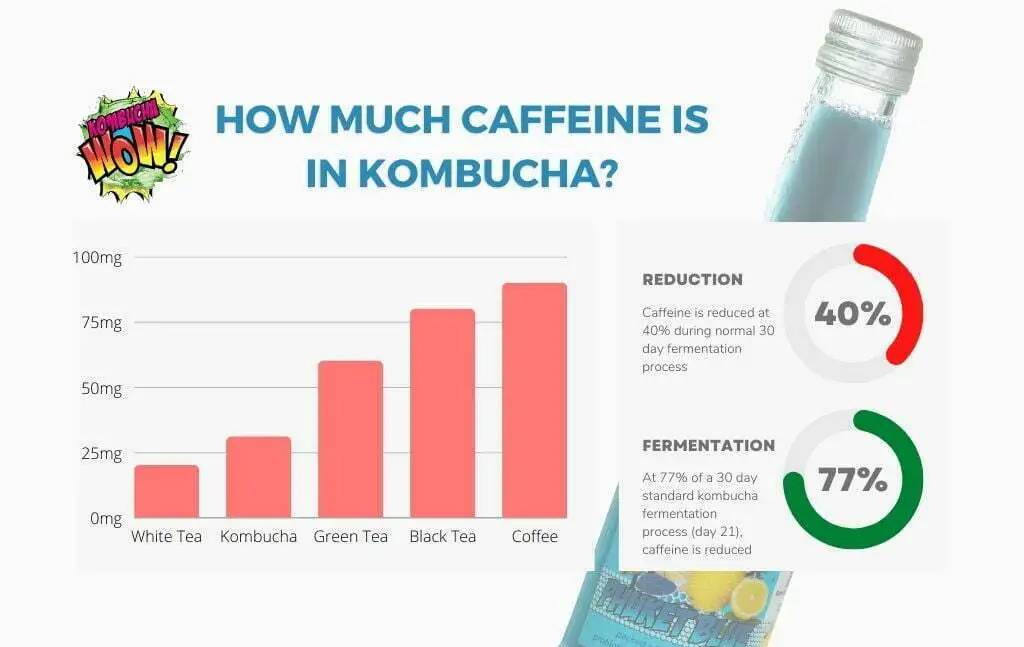Kombucha, a fermented tea beverage, has been gaining popularity worldwide due to its potential health benefits. From improving digestion to boosting the immune system, the list of benefits seems endless.
But there’s one question that often arises among Kombucha enthusiasts: Does Kombucha contain caffeine?
This article aims to unveil the truth about caffeine in Kombucha.
What is Kombucha?
Kombucha is a fermented beverage made from sweetened tea and a specific culture known as SCOBY (Symbiotic Culture Of Bacteria and Yeast).
Originating in Northeast China around 220 B.C., Kombucha has a rich history. It was traditionally known as the “Tea of Immortality” due to its health benefits.
The process of making Kombucha involves brewing tea (usually black or green tea), adding sugar, and then adding the SCOBY. The mixture is then left to ferment for a week or more.
During this time, the SCOBY consumes the sugar, producing a range of organic acids, vitamins, and probiotics. The result is a tangy, slightly sweet, and fizzy drink.
There are different types of Kombucha depending on the type of tea used and the duration of fermentation. Some Kombucha drinks may also contain flavors from fruits or herbs added during a second fermentation process.
Don’t Miss: National Onion Day: Unpeeling the Health Benefits of Onions
Does Kombucha Contain Caffeine?

The short answer is yes, Kombucha does contain caffeine.
The caffeine content in Kombucha comes from the tea used in its production. Both green and black teas naturally contain caffeine, and since they serve as the base for Kombucha, some caffeine remains in the final product.
However, the amount of caffeine in Kombucha is usually much less than the tea it’s made from. This is because the fermentation process can reduce the caffeine content.
The SCOBY metabolizes some of the caffeine during fermentation, but not all of it. Therefore, if you’re sensitive to caffeine, it’s important to consider this when consuming Kombucha.
Also, read: Monsoon Hair Care: Your Ultimate Guide to Healthy Hair This Rainy Season
Impact of Caffeine in Kombucha
The caffeine content in Kombucha can vary widely depending on several factors, including the type of tea used, the brewing time, and the fermentation process.
On average, an 8-ounce serving of Kombucha can contain anywhere from 10 to 25 milligrams of caffeine. In comparison, an 8-ounce cup of coffee contains around 95 milligrams of caffeine.
While the caffeine content in Kombucha is significantly lower than many other caffeinated beverages, it’s still important to consider, especially for those who are sensitive to caffeine. Caffeine can have both positive and negative effects on the body.
It can increase alertness and improve mood, but it can also cause jitteriness, rapid heart rate, and disrupt sleep in some individuals.

How to Control Caffeine Content in Kombucha
If you’re making Kombucha at home and want to control the caffeine content, there are a few strategies you can use:
- Use Less Tea: The amount of tea used in the brewing process will directly affect the caffeine content. By using less tea, you can reduce the amount of caffeine in the final product.
- Shorten Brew Time: The longer the tea is steeped, the more caffeine is extracted. By reducing the brew time, you can limit the amount of caffeine in your Kombucha.
- Use Low-Caffeine or Decaffeinated Tea: Not all teas have the same caffeine content. White and green teas generally have less caffeine than black tea. You can also use decaffeinated tea, but keep in mind that the SCOBY needs some caffeine to thrive.
- Use Herbal Teas: Herbal teas are naturally caffeine-free and can be used to make Kombucha. However, it’s important to note that not all herbal teas are suitable for Kombucha brewing. Some herbs can inhibit the SCOBY’s growth.
Also, read: Space Travel’s Impact on Immune System: Alarming Findings from a New Study
Conclusion
Kombucha is a delicious and healthful beverage that can be a part of a balanced diet. While it does contain some caffeine, the amount is typically much less than other caffeinated beverages like coffee and tea.
If you’re sensitive to caffeine, consider the tips mentioned above to control the caffeine content in your homemade Kombucha. Remember, every batch of Kombucha is unique, and part of the fun is in experimentation!
Also, read: Get Rid of Armpit Fat for Good: Your Ultimate Fitness Guide!
FAQs
What is Kombucha?
Kombucha is a fermented beverage made from sweetened tea and a specific culture known as SCOBY (Symbiotic Culture Of Bacteria and Yeast). It originates from Northeast China and is known for its potential health benefits.
How is Kombucha made?
Kombucha is made by brewing tea (usually black or green tea), adding sugar, and then adding the SCOBY. The mixture is then left to ferment for a week or more. During this time, the SCOBY consumes the sugar, producing a range of organic acids, vitamins, and probiotics.
Does Kombucha contain caffeine?
Yes, Kombucha does contain caffeine. The caffeine content in Kombucha comes from the tea used in its production. However, the amount of caffeine in Kombucha is usually much less than the tea it’s made from as the fermentation process can reduce the caffeine content.
How much caffeine is in Kombucha?
The caffeine content in Kombucha can vary widely depending on several factors, including the type of tea used, the brewing time, and the fermentation process. On average, an 8-ounce serving of Kombucha can contain anywhere from 10 to 25 milligrams of caffeine.
Can I control the caffeine content in my homemade Kombucha?
Yes, you can control the caffeine content in your homemade Kombucha. You can use less tea, shorten the brew time, use low-caffeine or decaffeinated tea, or use herbal teas.
Is the caffeine in Kombucha harmful?
Caffeine can have both positive and negative effects on the body. It can increase alertness and improve mood, but it can also cause jitteriness, rapid heart rate, and disrupt sleep in some individuals. The caffeine content in Kombucha is significantly lower than many other caffeinated beverages, but it’s still important to consider, especially for those who are sensitive to caffeine.
What are the effects of caffeine in Kombucha?
The effects of caffeine in Kombucha are similar to those of other caffeinated beverages, though typically less pronounced due to the lower caffeine content. Caffeine can increase alertness, improve mood, boost metabolism, and enhance exercise performance. However, it can also lead to side effects like jitteriness, insomnia, and increased heart rate in some individuals.
In Health and Tech: Blockchain in Healthcare: Revolutionizing Electronic Health Records


One Comment
Leave a ReplyOne Ping
Pingback:Family Nudism: A Path To Body Positivity - Stagbite